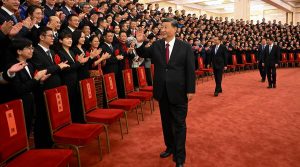
Protests against the zero-COVID policy in China quickly spread across the country. While Anti-COVID protests are certainly not a new global phenomenon, such a public and widely spread expression of frustration towards the Chinese government is rarely seen.
This note examines the Chinese top level leadership’s approach to the zero-COVID policy; why it led to mounting public anger and frustration; and where it may lead.
The Initial Approach – Central Government’s Blame Avoidance
While President Xi vowed that he will “supervise and deploy (COVID-19 prevention operations) personally”, the COVID-19 prevention throughout the country took on a decentralized approach.[1] In other words, the order (of no COVID cases) was delivered by the Central Government, but it was up to the local authorities to interpret the order and execute it. For instance, each province has its own mandatory QR code system that rated users’ risk of exposure to COVID-19, and each province had its own domestic and international arrival quarantine requirements.
As power becomes more consolidated within the CPC, it would only appear plausible that the whole country would take on a centralized approach for COVID-19 strategy such as a national QR code system and a standardized requirement for traveling and quarantine. Nevertheless, these decentralized approaches were permitted to continue in the past two years. Frequently, these inconsistent COVID policies among provinces and regions in China caused confusion and frustrations among residents and travellers. This could be viewed as the Central Government’s strategy for ‘blame avoidance’. By providing an opaque order of “no COVID cases”, the Central Government shifts responsibilities to the local governments while leaving them to interpret its own plan. If the strategy is successful, the Central Government, or President Xi himself, could take credit as the operations are overseen by him “personally”.[2] In the event that the strategy is unsuccessful, or controversial, residents naturally would hold the local government accountable as they implemented these procedures.
Too Little To Lose?
A stable society based on rapid economic growth has been a key goal of the CPC. The idea of “you can earn money and spend money but don’t touch politics” is an unspoken social contract among many Chinese and foreign citizens and companies. While China enjoyed rapid economic growth, so also its middle class. Owning at least an apartment and a vehicle and living comfortably have already become the default goal of many middle class citizens. Based on the prerequisite of not participating in politics, these goals are achievable when the balance of the ability to earn a decent wage and reasonable cost of living is maintained. The Chinese citizens know very well that what they have accomplished and acquired could be lost very quickly if they are disobedient to the government. Therefore, most citizens have chosen to refrain from directly criticizing the government for its actions.
With a decelerating economy, however, this balance of economic advancement and political silence is eroding. In major cities such as Beijing and Shanghai, it is hardly possible for youth to find a job that pays high enough to support themselves and afford an apartment or vehicle. The draconian COVID measures further impeded citizens’ ability to find jobs and get paid; hence, their ability to make new purchases. According to the National Bureau of Statistics, real estate development between January 2022 to July 2022 dropped by 6.4 percent while residential investment dropped by 5.8 percent.[3] On the other hand, major online shopping platforms often publish sales volume during November 11th, Single’s Day.[4] According to Sohu News, online shopping platforms such as Alibaba and Tmall both recorded double digit or triple digit growth in sales volume in the past several years.[5] Nevertheless, Tmall did not disclose its sales volume for 2022, instead it published a statement that “the sales volume was largely the same as last year”.[6] These moderated data could also suggest that the general public prefers to save their money instead of spending it given their job stability is affected by the unpredictable COVID policies.
